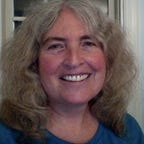From GRID To AIDS: Beginning My Career as AIDS Hit San Francisco
With deepest gratitude to the young men who allowed me into their lives and into their deaths
July, early 1980s, San Francisco.
A month before my 25th birthday, I began my clinical training in mental health. I was doing a rotation in a crisis clinic, a small psych emergency room affiliated with a larger hospital. I was eager to get out of the classroom and start working with clients.
I had no idea that the nation’s health care community was at a crossroads, entirely unprepared for what was about to unfold.
Within a few weeks, we began to see a new presentation, which quickly developed into a pattern. A young man would be brought in, overtly psychotic or confused and delirious. We’d ask questions and find out that he had a steady job, a strong friendship group, sometimes a partner, and no psych history.
Further questions would rule out recreational drugs as the cause. He’d also have a recent medical history that made no sense — sometimes a rare form of cancer, sometimes terrible skin lesions, sometimes a parasite only seen in sheep. He would have lost an alarming amount of weight in a startlingly short period of time. He would be in his 20s and gay.
He was a healthy young man who was inexplicably dying.
Initially, we didn’t understand the cause (single agent? combination?), or how the virus was transmitted (sexual contact? airborne? insect bite?).
Until that point, “safe sex” meant preventing pregnancy; the idea of gay men using “protection” during sex was ludicrous. As the medical community realized that HIV was sexually transmitted, many people put up huge resistance to precautions like using condoms and closing the famous San Francisco bath houses.
With our nation’s bruised history of homophobia, with self-proclaimed religious leaders ranting that AIDS was a “scourge” from God, folks in the gay community understandably wondered if these “protective measures” were actually the next bigoted attempts to shut down gay sex.
I figured if I asked my patients to step up and deal with their fear, then the least I could do was step up and deal with my own
I remember having lunch with a group at the hospital. We were all in training, in different fields of health care. One woman — bright, dedicated and decent to the bone — asked if the patients I had seen were truly all gay men, or if that was homophobic propaganda. I assured her it was true — which made no sense to any of us.
We sat around our table and brainstormed, wondering if there could be some sort of medical phenomenon, making males in their 20s more vulnerable than females in their 90s. But that didn’t help us understand the gay factor or the sheep. One person grew up on a farm, and we questioned him about rare illnesses in animals…which of course clarified nothing. In all of the patients I had seen, 100% were gay and male; 0% had contact with sheep.
Looking back, it seems like an idiotic discussion; at that time, we were scrambling — sharply aware that as we ate our sandwiches, people were dying.
Over time, the diagnosis evolved from Gay Cancer or GRID (Gay Related Immune Deficiency) to AIDS. But we still had no medication to manage the condition. AIDS was a death sentence, and the path from diagnosis to death was brutal.
The following year, my training program offered the opportunity to work on the “AIDS Ward” at San Francisco General Hospital. This unit was set up solely for AIDS patients, staffed entirely by people who chose to be there. Even as a trainee, I was given the choice to opt out, because everyone was so frightened. But I figured if I asked my patients to step up and deal with their fear, then the least I could do was step up and deal with my own.
To this day, I’ve never seen a better run unit in any hospital. I’ve never been in an environment with a stronger sense of teamwork, with more exemplary patient care.
Working on the AIDS Ward was a privilege.
It was also a heartbreak.
As a psych trainee, I was called in for mental health issues. Some patients needed meds when the virus attacked their brain, but most needed to talk. They asked questions, trying to understand. Sometimes I had answers; usually I didn’t. I listened to their stories, each unique, each the same.
My main role was to help them catch up to themselves. AIDS had slammed them, a blitzkrieg assault with such force that they had no time to adjust. Some showed me photographs, pre-AIDS, smiling and strong. The pictures captured an experience that defied language, as they grieved for their former selves.
I helped them build an emotional bridge between their then and their now.
I’ll always remember those young men who lived, loved, fought, lost. I’m grateful to them, to their friends and to their families for allowing me into their lives and into their deaths. I wish I could tell them, all these years later, that they paved the way for others to survive. I hope they know how valuable they were to me.
I dedicate this piece to them.
